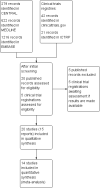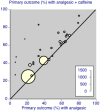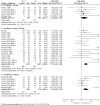Caffeine as an analgesic adjuvant for acute pain in adults
- PMID: 25502052
- PMCID: PMC6485702
- DOI: 10.1002/14651858.CD009281.pub3
Caffeine as an analgesic adjuvant for acute pain in adults
Abstract
Background: This is an updated version of the original Cochrane review published in Issue 3, 2012. Caffeine has been added to common analgesics such as paracetamol, ibuprofen, and aspirin, in the belief that it enhances analgesic efficacy. Evidence to support this belief is limited and often based on invalid comparisons.
Objectives: To assess the relative efficacy of a single dose of an analgesic plus caffeine against the same dose of the analgesic alone, without restriction on the analgesic used or the pain condition studied. We also assessed serious adverse events.
Search methods: We searched CENTRAL, MEDLINE, and EMBASE from inception to 28 August 2014, the Oxford Pain Relief Database, and also carried out Internet searches and contacted pharmaceutical companies known to have carried out trials that have not been published.
Selection criteria: We included randomised, double-blind studies that compared a single dose of analgesic plus caffeine with the same dose of the analgesic alone in the treatment of acute pain.
Data collection and analysis: Two review authors independently assessed the eligibility and quality of studies, and extracted data. Any disagreements or uncertainties were settled by discussion with a third review author. We sought any validated measure of analgesic efficacy, but particularly the number of participants experiencing at least 50% of the maximum possible pain relief over four to six hours, participants reporting a global evaluation of treatment of very good or excellent, or headache relief after two hours. We pooled comparable data to look for a statistically significant difference, and calculated numbers needed to treat to benefit (NNT) with caffeine. We also looked for any numerical superiority associated with the addition of caffeine, and information about any serious adverse events.
Main results: We identified no new studies with available results for this update. The earlier review included 20 studies (7238 participants) in valid comparisons, but because we used different outcomes for some headache studies, the number of participants in the analyses of the effects of caffeine is now 4262 when previously it was 5243. The studies were generally of good methodological quality, using standard designs and mostly standard scales of pain measurement, although many of those treating postoperative pain were small.Most studies used paracetamol or ibuprofen, with 100 mg to 130 mg caffeine, and the most common pain conditions studied were postoperative dental pain, postpartum pain, and headache. There was a small but statistically significant benefit with caffeine used at doses of 100 mg or more, which was not dependent on the pain condition or type of analgesic. About 5% to 10% more participants achieve a good level of pain relief (at least 50% of the maximum over four to six hours) with the addition of caffeine, giving a NNT of about 14 (high quality evidence).Most comparisons individually demonstrated numerical superiority with caffeine, but not statistical superiority. One serious adverse event was reported with caffeine, but was considered unrelated to any study medication.We know of the existence of around 25 additional studies with almost 12,500 participants for which data for analysis were not obtainable. The additional analgesic effect of caffeine remained statistically significant but clinically less important even if all the known missing data had no effect; the bulk of the unobtainable data are reported to have similar results as this review.
Authors' conclusions: The addition of caffeine (≥ 100 mg) to a standard dose of commonly used analgesics provides a small but important increase in the proportion of participants who experience a good level of pain relief.
Conflict of interest statement
CD has no conflicts relating to this review or any similar product.
SD has no conflicts relating to this review or any similar product.
RAM has no conflicts relating to this review or any similar product.
For transparency we have received research support from charities, government, and industry sources at various times, but none relate to this review. We are funded by the NIHR for work on a series of reviews informing the unmet need of chronic pain and providing the evidence for treatments of pain.
Figures








Update of
References
References to studies included in this review
Ali 2007 {published data only}
-
- Ali Z, Burnett I, Eccles R, North M, Jawad M, Jawad S, et al. Efficacy of a paracetamol and caffeine combination in the treatment of the key symptoms of primary dysmenorrhoea. Current Medical Research and Opinion 2007;23(4):841‐51. - PubMed
Diamond 2000 {published data only}
-
- Diamond S, Balm TK, Freitag FG. Ibuprofen plus caffeine in the treatment of tension‐type headache. Clinical Pharmacology and Therapeutics 2000;68(3):312‐9. - PubMed
-
- Diamond S, Freitag FG. The use of ibuprofen plus caffeine to treat tension‐type headache. Current Pain and Headache Reports 2001;5(5):472‐8. - PubMed
Diener 2005 {published data only}
-
- Diener HC, Pfaffenrath V, Pageler L, Peil H, Aicher B. The fixed combination of acetylsalicylic acid, paracetamol and caffeine is more effective than single substances and dual combination for the treatment of headache: a multicentre, randomized, double‐blind, single‐dose, placebo‐controlled parallel group study. Cephalalgia 2005;25(10):776‐87. - PubMed
-
- Pfaffenrath V, Diener HC, Pageler L, Peil H, Aicher B. OTC analgesics in headache treatment: open‐label phase vs randomized double‐blind phase of a large clinical trial. Headache 2009;49(5):638‐45. - PubMed
Forbes 1990 {published data only}
-
- Forbes JA, Jones KF, Kehm CJ, Smith WK, Gongloff CM, Zeleznock JR, et al. Evaluation of aspirin, caffeine, and their combination in postoperative oral surgery pain. Pharmacotherapy 1990;10(6):387‐93. - PubMed
Forbes 1991 {published data only}
-
- Forbes JA, Beaver WT, Jones KF, Kehm CJ, Smith WK, Gongloff CM, et al. Effect of caffeine on ibuprofen analgesia in postoperative oral surgery pain. Clinical Pharmacology and Therapeutics 1991;49(6):674‐84. - PubMed
Laska 1983 Study 1 {published data only}
-
- Laska EM, Sunshine A, Zighelboim I, Roure C, Marrero I, Wanderling J, et al. Effect of caffeine on acetaminophen analgesia. Clinical Pharmacology and Therapeutics 1983;33(4):498‐509. - PubMed
Laska 1983 Study 2 {published data only}
-
- Laska EM, Sunshine A, Zighelboim I, Roure C, Marrero I, Wanderling J, et al. Effect of caffeine on acetaminophen analgesia. Clinical Pharmacology and Therapeutics 1983;33(4):498‐509. - PubMed
Laska 1983 Study 3 {published data only}
-
- Laska EM, Sunshine A, Zighelboim I, Roure C, Marrero I, Wanderling J, et al. Effect of caffeine on acetaminophen analgesia. Clinical Pharmacology and Therapeutics 1983;33(4):498‐509. - PubMed
Laska 1983 Study 4 {published data only}
-
- Laska EM, Sunshine A, Zighelboim I, Roure C, Marrero I, Wanderling J, et al. Effect of caffeine on acetaminophen analgesia. Clinical Pharmacology and Therapeutics 1983;33(4):498‐509. - PubMed
McQuay 1996 {published data only}
-
- McQuay HJ, Angell K, Carroll D, Moore RA, Juniper RP. Ibuprofen compared with ibuprofen plus caffeine after third molar surgery. Pain 1996;66(2‐3):247‐51. - PubMed
Migliardi 1994 Study 1 {published data only}
-
- Migliardi JR, Armellino JJ, Friedman M, Gillings DB, Beaver WT. Caffeine as an analgesic adjuvant in tension headache. Clinical Pharmacology and Therapeutics 1994;56(5):576‐86. - PubMed
Migliardi 1994 Study 2 {published data only}
-
- Migliardi JR, Armellino JJ, Friedman M, Gillings DB, Beaver WT. Caffeine as an analgesic adjuvant in tension headache. Clinical Pharmacology and Therapeutics 1994;56(5):576‐86. - PubMed
Peroutka 2004 {published data only}
-
- Peroutka SJ, Lyon JA, Swarbrick J, Lipton RB, Kolodner K, Goldstein J. Efficacy of diclofenac sodium softgel 100 mg with or without caffeine 100 mg in migraine without aura: a randomized, double‐blind, crossover study. Headache 2004;44(2):136‐41. - PubMed
Schachtel 1991a {published data only}
-
- Schachtel BP, Fillingim JM, Lane AC, Thoden WR, Baybutt RI. Caffeine as an analgesic adjuvant. A double‐blind study comparing aspirin with caffeine to aspirin and placebo in patients with sore throat. Archives of Internal Medicine 1991;151(4):733‐7. - PubMed
Sunshine 1996 {published data only}
-
- Sunshine A, Zighelboim I, Bartizek RD. A double‐blind, placebo‐controlled, single‐dose comparison study of ibuprofen, and ibuprofen in combination with caffeine, in the treatment of postepisiotomy pain. Royal Society of Medicine International Congress and Symposium Series 218 1996;218:105‐88.
Tokola 1984 {published data only}
-
- Tokola RA, Kangasniemi P, Neuvonen PJ, Tokola O. Tolfenamic acid, metoclopramide, caffeine and their combinations in the treatment of migraine attacks. Cephalalgia 1984;4(4):253‐63. - PubMed
Ward 1991 {published data only}
-
- Ward N, Whitney C, Avery D, Dunner D. The analgesic effects of caffeine in headache. Pain 1991;44(2):151‐5. - PubMed
Winter 1983 {published data only}
-
- Winter L Jr, Appleby F, Ciccone PE, Pigeon JG. A double‐blind, comparative evaluation of acetaminophen, caffeine, and the combination of acetaminophen and caffeine in outpatients with post‐operative oral surgery pain. Current Therapeutic Research 1983;33(1):115‐22.
Wójcicki 1977 study 1 {published data only}
-
- Wójcicki J, Samochowiec L, Lawczyński L, Szwed G, Olszewska M. A double‐blind comparative evaluation of aspirin, paracetamol and paracetamol + caffeine (Finimal) for their analgesic effectiveness. Archivum Immunologiae et Therapiae Experimentalis 1977;25(2):175‐9. - PubMed
Wójcicki 1977 Study 2 {published data only}
-
- Wójcicki J, Samochowiec L, Lawczyński L, Szwed G, Olszewska M. A double‐blind comparative evaluation of aspirin, paracetamol and paracetamol + caffeine (Finimal) for their analgesic effectiveness. Archivum Immunologiae et Therapiae Experimentalis 1977;25(2):175‐9. - PubMed
References to studies excluded from this review
BMS summary {unpublished data only}
-
- Anon. Citizen Petition Summary. http://www.fda.gov/ohrms/dockets/dockets/77n0094/77n‐0094‐cp00015_01.pdf (accessed 5 December 2014).
Jain 1988 {published data only}
-
- Jain AK, McMahon FG, Ryan JR, Narcisse C. A double‐blind study of ibuprofen 200 mg in combination with caffeine 100 mg, ibuprofen 400 mg, and placebo in episiotomy pain. Current Therapeutic Research 1988;43(4):762‐9.
Laska 1984 {published data only}
-
- Laska EM, Sunshine A, Mueller F, Elvers WB, Siegel C, Rubin A. Caffeine as an analgesic adjuvant. JAMA 1984;251(13):1711‐8. - PubMed
Migliardi 1994a {published data only}
-
- Migliardi JR, Armellino JJ, Friedman M, Gillings DB, Beaver WT. Caffeine as an analgesic adjuvant in tension headache. Clinical Pharmacology and Therapeutics 1994;56(5):576‐86. - PubMed
Mitchell 2008 {published data only}
-
- Mitchell A, Zanten SV, Inglis K, Porter G. A randomized controlled trial comparing acetaminophen plus ibuprofen versus acetaminophen plus codeine plus caffeine after outpatient general surgery. Journal of the American College of Surgeons 2008;206(3):472‐9. - PubMed
Schachtel 1991b {published data only}
-
- Schachtel BP, Thoden WR, Konerman JP, Brown A, Chaing DS. Headache pain model for assessing and comparing the efficacy of over‐the‐counter analgesic agents. Clinical Pharmacology & Therapeutics 1991;50(3):322‐9. - PubMed
References to studies awaiting assessment
IRCT201306121760N24 {published data only}
-
- Comparison of analgesic effect ‐ the combination of acetaminophen and ibuprofen in the presence and absence of caffeine on pain after root canal treatment. who.int/trialsearch/Trial2.aspx?TrialID=IRCT201306121760N24 2014 (accessed 28 August 2014). [IRCT: IRCT201306121760N24]
NCT00471952 {published data only}
-
- Maxalt 10 mg plus caffeine 75 mg in the acute treatment of migraine headache. clinicaltrials.gov/ct2/results?term=NCT00471952&Search=Search 2014 (accessed 28 August 2014). [NCT: NCT00471952]
NCT01172405 {published data only}
-
- Efficacy and safety study to compare ibuprofen + caffeine with ibuprofen alone in the treatment of headache. clinicaltrials.gov/ct2/results?term=NCT01172405&Search=Search 2014 (accessed 28 August 2014). [NCT: NCT01172405]
NCT01929031 {published data only}
-
- A single‐centre, double‐blind, randomised, two‐stage, parallel‐group study to assess the efficacy and safety of the fixed dose combination of ibuprofen 400 mg and caffeine 100 mg versus ibuprofen 400 mg, caffeine 100 mg and placebo in patients with postoperative dental pain. clinicaltrials.gov/ct2/results?term=NCT01929031&Search=Search 2014 (accessed 28 August 2014). [NCT: NCT01929031]
NCT02183688 {published data only}
-
- Acetylsalicylic acid (ASA) + paracetamol + caffeine combination compared with ASA + paracetamol as well as ASA, paracetamol, and caffeine in headache patients. clinicaltrials.gov/ct2/show/NCT02183688?term=NCT02183688&rank=1 2014 (accessed 28 August 2014). [NCT: NCT02183688]
Additional references
Basurto Ona 2013
Beaver 1984
-
- Beaver WT. Caffeine revisited. JAMA 1984;251(13):1732‐3. - PubMed
Cook 1995
Cooper 1991
-
- Cooper SA. Single‐dose analgesic studies: the upside and downside of assay sensitivity. The Design of Analgesic Clinical Trials. Advances in Pain Research Therapy 1991;18:117‐24.
Dechartres 2013
Donovan 2001
-
- Donovan JL, DeVane CL. A primer on caffeine pharmacology and its drug interactions in clinical psychopharmacology. Psychopharmacology Bulletin 2001;35(3):30‐48. - PubMed
Higgins 2011
-
- Higgins JPT, Altman DG, Sterne JAC. Chapter 8: Assessing risk of bias in included studies. In Higgins JPT, Green S (editors). Cochrane Handbook for Systematic Reviews of Interventions Version 5.1.0 [updated March 2011]. The Cochrane Collaboration, 2011. Available from www.cochrane‐handbook.org.
Jadad 1996a
-
- Jadad AR, Carroll D, Moore RA, McQuay H. Developing a database of published reports of randomised clinical trials in pain research. Pain 1996;66(2‐3):239‐46. - PubMed
Jadad 1996b
-
- Jadad AR, Moore RA, Carroll D, Jenkinson C, Reynolds DJM, Gavaghan DJ, et al. Assessing the quality of reports of randomized clinical trials: is blinding necessary?. Controlled Clinical Trials 1996;17:1‐12. - PubMed
Jain 1978
-
- Jain AK, McMahon FG, Ryan JR, Unger D, Richard W. Aspirin and aspirin‐caffeine in postpartum pain relief. Clinical Pharmacology and Therapeutics 1978;24(1):69‐75. - PubMed
Juliano 2004
L'Abbé 1987
-
- L'Abbé KA, Detsky AS, O'Rourke K. Meta‐analysis in clinical research. Annals of Internal Medicine 1987;107:224‐33. - PubMed
Li Wan Po 1998
-
- Li Wan Po A, Zhang WY. Analgesic efficacy of ibuprofen alone and in combination with codeine or caffeine in post‐surgical pain: a meta‐analysis. European Journal of Clinical Pharmacology 1998;53:303‐11. - PubMed
McQuay 2007
Moore 1996
Moore 1997a
Moore 1997b
Moore 1998
Moore 2008
-
- Moore RA, Barden J, Derry S, McQuay HJ. Managing potential publication bias. In: McQuay HJ, Kalso E, Moore RA editor(s). Systematic Reviews in Pain Research: Methodology Refined. Seattle: IASP Press, 2008:15‐24. [ISBN: 978‐0‐931092‐69‐5]
Moore 2014
Morris 1995
-
- Morris JA, Gardner MJ. Calculating confidence intervals for relative risk, odds ratio and standardised ratios and rates. In: Gardner MJ, Altman DG editor(s). Statistics with Confidence ‐ Confidence Intervals and Statistical Guidelines. London: BMJ Books, 1995:50‐63.
Nüesch 2010
Palmer 2010
Renner 2007
-
- Renner B, Clarke G, Grattan T, Beisel A, Mueller C, Werner U, et al. Caffeine accelerates absorption and enhances the analgesic effect of acetaminophen. Journal of Clinical Pharmacology 2007;47(6):715‐26. - PubMed
RevMan 2014 [Computer program]
-
- The Nordic Cochrane Centre, The Cochrane Collaboration. Review Manager (RevMan). Version 5.3. Copenhagen: The Nordic Cochrane Centre, The Cochrane Collaboration, 2014.
Sawynok 1993
-
- Sawynok J, Yaksh TL. Caffeine as an analgesic adjuvant: a review of pharmacology and mechanisms of action. Pharmacological Reviews 1993;45(1):43‐85. - PubMed
Sawynok 2011a
Sawynok 2011b
Sawynok 2011c
Schachtel 1991
-
- Schachtel BP, Fillingim JM, Lane AC, Thoden WR, Baybutt RI. Caffeine as an analgesic adjuvant. A double‐blind study comparing aspirin with caffeine to aspirin and placebo in patients with sore throat. Archives of Internal Medicine 1991;151(4):733‐7. - PubMed
Tramèr 1997
Zhang 1996
-
- Zhang WY, Li Wan Po A. Analgesic efficacy of paracetamol and its combination with codeine and caffeine in surgical pain ‐ a meta‐analysis. Journal of Clinical Pharmacology and Therapeutics 1996;21(4):261‐82. - PubMed
Zhang 1997
-
- Zhang WY, Po AL. Do codeine and caffeine enhance the analgesic effect of aspirin? A systematic overview. Journal of Clinical Pharmacology and Therapeutics 1997;22(2):79‐97. - PubMed
Zhang 2001
-
- Zhang WY. A benefit‐risk assessment of caffeine as an analgesic adjuvant. Drug Safety 2001;24(15):1127‐42. - PubMed
Publication types
MeSH terms
Substances
LinkOut - more resources
Full Text Sources
Other Literature Sources
Medical

